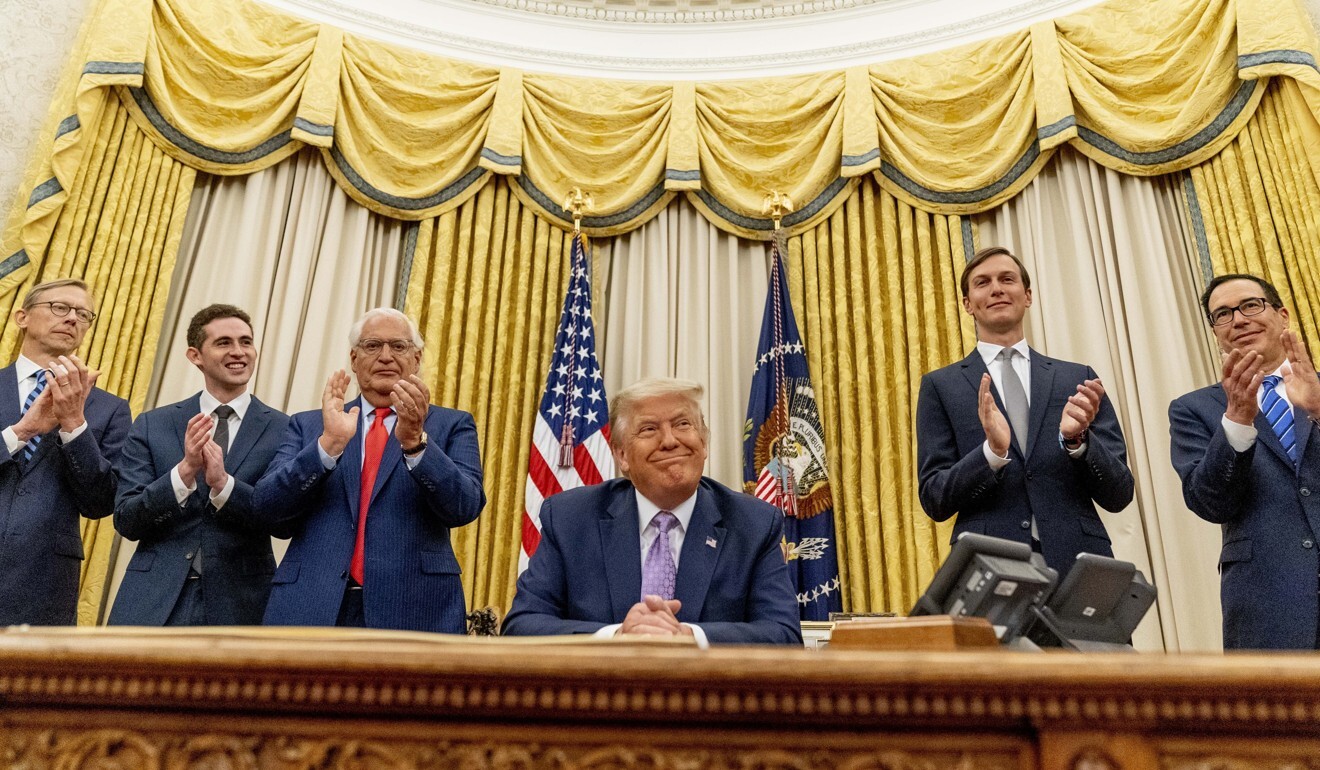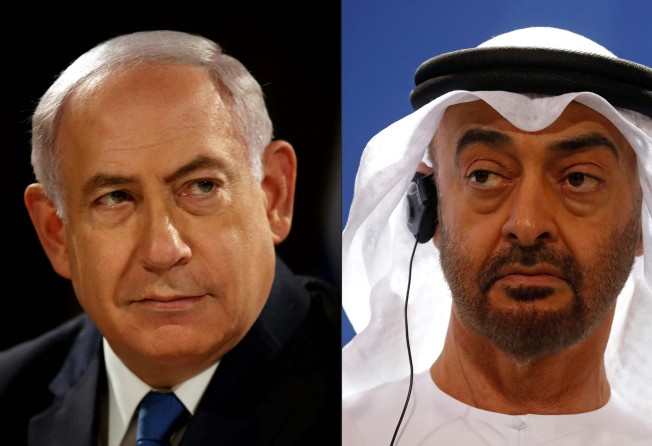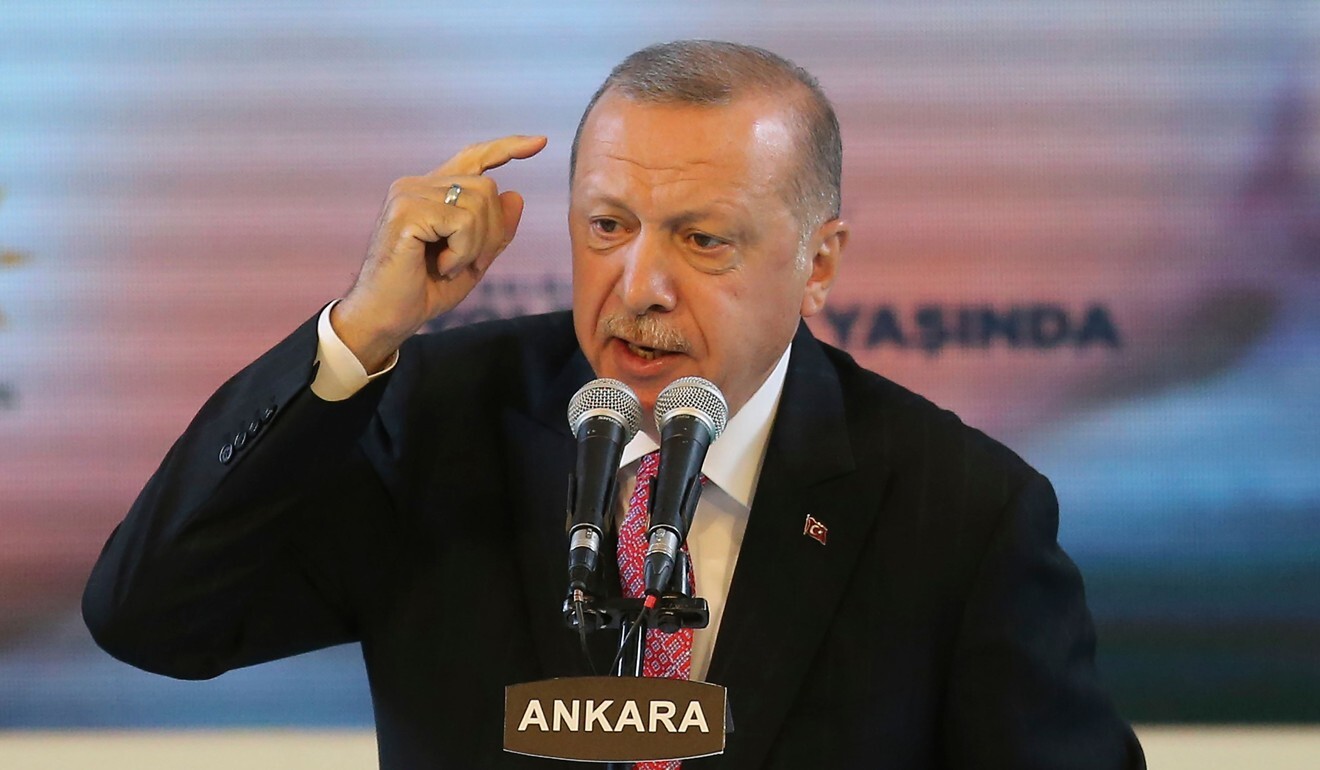
Iran and Turkey slam Israel-UAE deal as ‘strategic stupidity’ and ‘betrayal’ of Palestinians
- Establishing diplomatic ties between Israel and Washington’s Middle East allies has been central to Trump’s regional strategy to contain Iran
- President Abdel Fattah al-Sisi of Egypt, which signed a treaty with Israel in 1979 to opposition from across the Arab world, praised the deal

Iran and Turkey on Friday condemned a landmark deal which saw the United Arab Emirates (UAE) normalising relations with Israel, with Ankara calling it a betrayal of the Palestinians and Tehran labelling it “a strategic stupidity”.
The deal, orchestrated by US President Donald Trump’s administration, makes the UAE the first Arab country in nearly 26 years to recognise the majority-Jewish state.
“The history and conscience of the people in the region will not forget and will never forgive such a hypocritical act by the UAE,” the Turkish Foreign Ministry said in a statement on Friday. The UAE acted for “its own narrow interests” to support a “stillborn and invalid US plan”, it added.
“That was a strategic stupidity that will ultimately only strengthen the anti-Israeli resistance front,” the Iranian Foreign Ministry said in a press release on Friday.
“The Palestinians will never forgive this agreement with the criminal regime of Israel,” the ISNA news agency cited the ministry as saying.
Following the deal, Israel suspended its push to extend sovereignty over parts of the occupied West Bank.

In Palestine, the leadership voiced its “strong rejection and condemnation” of the deal and announced it would withdraw its envoy from the UAE.
President Mahmud Abbas called the agreement an “aggression” against the Palestinian people and a “betrayal” of their cause, including their claim to Jerusalem as capital of their future state.
Hazem Qasem, spokesman for Palestinian Islamist group Hamas, which controls the Gaza Strip, said the deal “does not serve the Palestinian cause”, calling it “a reward for the Israeli occupation and crimes”.
Israeli Prime Minister Benjamin Netanyahu, the UAE’s de-facto ruler Mohammed bin Zayed and Trump hailed the agreement as “historic”.
UAE Minister of State for Foreign Affairs Anwar Gargash said: “While the peace decision remains basically a Palestinian-Israeli one, the bold initiative of Sheikh Mohammed bin Zayed has allowed, by banishing the spectre of annexing Palestinian lands, more time for peace opportunities through the two-state solution.”
The two-state solution envisages an end to the decades-old Palestinian-Israeli conflict by setting up a Palestinian state alongside Israel, but recent policy moves by the US and Israel have increasingly put this scenario in doubt.
“Developing normal ties in return for this is a realistic approach forwarded by the Emirates,” Gargash added.
Establishing diplomatic ties between Israel and Washington’s Middle East allies, including the oil-rich Gulf states, has been central to Trump’s regional strategy to contain Iran.
“HUGE breakthrough today! Historic Peace Agreement between our two GREAT friends, Israel and the United Arab Emirates!” Trump said on Twitter.
“Everybody said this would be impossible ... After 49 years Israel and the United Arab Emirates will fully normalise their diplomatic relations,” he later told reporters.
US Democratic White House candidate Joe Biden called the UAE’s move “a welcome, brave, and badly-needed act of statesmanship”.
White House adviser Jared Kushner, who helped draw up Trump’s controversial Middle East peace plan, described the deal as “an icebreaker” and voiced hopes of seeing “countries start to do the same”.

President Abdel Fattah al-Sisi of Egypt, which signed a treaty with Israel in 1979 to opposition from across the Arab world, praised the deal on “the halt of Israel’s annexation of Palestinian land,” and said he hoped it would bring “peace”.
Jordan, which borders the West Bank and Israel, said the outcome of the agreement would depend on Israel’s actions, including its stance on a two-state solution with the Palestinians.
Foreign Minister Ayman al-Safadi said: “the impact of the deal on peace efforts is linked to the actions Israel will take”.
In Germany, Foreign Minister Heiko Maas welcomed the deal as “an important contribution to peace in the region”.
Maas, whose country currently holds the rotating EU presidency, said he had congratulated his Israeli counterpart Gabi Ashkenazi by phone on “this historic step”.
“We hope that this agreement will be the starting point for further positive developments in the region and that it will give fresh momentum to the Middle East peace process,” he added.
France also welcomed the deal, stressing the suspension of Israel’s plans to annex swathes of the occupied West Bank.
“The decision taken within this framework by the Israeli authorities to suspend the annexation of Palestinian territories is a positive step, which must become a definitive measure,” French Foreign Minister Jean-Yves Le Drian said in a statement.
UN chief Antonio Guterres said he hoped the deal would help realise a two-state solution.
“The secretary general (hopes) it will create an opportunity for Israeli and Palestinian leaders to re-engage in meaningful negotiations that will realise a two-state solution in line with relevant UN resolutions, international law and bilateral agreements,” his spokesman said.
Reporting by dpa and AFP